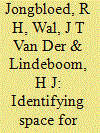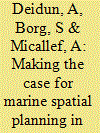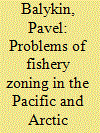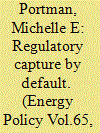|
|
|
Sort Order |
|
|
|
Items / Page
|
|
|
|
|
|
|
| Srl | Item |
| 1 |
ID:
176754


|
|
|
|
|
| Summary/Abstract |
The 2050 target of the European Union to decarbonize the economy by 80–90% will undoubtedly see marine renewable energies playing a key role. The deployment of offshore facilities within the framework of Blue Growth creates tension as competition for other uses of the sea intensifies as economic exploitation of marine resources increases. Marine spatial planning (MSP) is being applied in different Member States, mainly in the North Sea basin, as a way of easing tensions while promoting blue energy. The southernmost marine areas of the continent also have considerable energy potential that, as yet, has not been exploited due to the limitations imposed by a narrow and steep continental shelf, not to mention legal and administrative barriers. MSP processes currently being developed by the application of Directive 2014/89/EU present an opportunity to resolve these conflicts and promote sustainable use of MRE sources in southern Europe. This paper analyzes the marine spatial planning process of five southern European countries - Spain, Greece, Italy, Malta and Portugal - with the aim of determining the degree to which they are incorporating blue energy policies.
|
|
|
|
|
|
|
|
|
|
|
|
|
|
|
|
| 2 |
ID:
133177


|
|
|
|
|
| Publication |
2014.
|
| Summary/Abstract |
The increasing demand for renewable energy drives the development of offshore wind energy (OWE) leading to competing claims with other human and nature related uses of the North Sea. This paper investigates possibilities to identify space for new OWE while minimising effects on other uses. An inventory is made of the major uses in the Central and Southern North Sea, including the expected development towards 2030. The spatial distribution of non-wind uses is determined as well as the possibilities for differentiation based on density, economic value or nature value and co-existence. These possibilities are translated into calculation rules quantifying the relative importance. These calculation rules have been incorporated in a Decision Support System (DSS) to analyse how the priority of OWE development could impact non-wind uses. In a low OWE priority scenario consequences for other use was found to be very limited, with fisheries and wildlife affected most. In a high OWE priority scenario a considerable amount of OWE may be developed with substantial claims on sand extraction and military use areas and a shift towards higher value categories for shipping and fisheries. Relocation and co-existence of uses are important means to reduce the impact of increased OWE development.
|
|
|
|
|
|
|
|
|
|
|
|
|
|
|
|
| 3 |
ID:
104177


|
|
|
|
|
| Publication |
2011.
|
| Summary/Abstract |
Marine spatial planning (MSP) has been gaining in stature recently as an ecosystem-based tool for the management of marine space that promotes the sustainable and optimal use of resources with minimal stakeholder conflicts. Malta is the quintessential maritime nation, with a disproportionately large marine area compared to its terrestrial area. Nonetheless, its limited coastline, a considerable portion of which is inaccessible, poses inevitable conflicts between multiple marine activities and designations, including aquaculture, fishing, bunkering, coastal tourism, navigation, renewable energy installations, conservation of biological diversity and protected areas (on ecological criteria). This article makes the case to implement MSP-based policies and an applicable legal framework in the Maltese Islands.
|
|
|
|
|
|
|
|
|
|
|
|
|
|
|
|
| 4 |
ID:
090085


|
|
|
|
|
| Publication |
2009.
|
| Summary/Abstract |
The development of renewable energy as a major component of efforts to combat climate change serves as the impetus for the location of energy production facilities in coastal ocean space. Yet, while many coastal nations see offshore renewable energy development as an important way forward, the speed and manner in which these efforts take shape vary dramatically. This paper assesses the role of coastal nations' domestic legal and policy frameworks in the siting of offshore renewable energy facilities in areas under federal jurisdiction. It focuses on two nations-Germany and the United States. Both have articulated their interest in renewable offshore energy, but while Germany has approved many offshore sites, recent US proposals have for the most part stalled. Based on a review of legal and policy documents, laws and regulations, academic literature, and interviews, this research identifies and compares factors that figure most prominently for the development of offshore renewable energy policies. Comparisons are organized under four categories: the regulatory framework, the public's role in siting, targeted economic mechanisms, and indirect mechanisms. The paper concludes with observations about prominent supports and impediments and suggestions for further research.
|
|
|
|
|
|
|
|
|
|
|
|
|
|
|
|
| 5 |
ID:
164061


|
|
|
|
|
| Summary/Abstract |
This article notes the importance of food security and the serious lag of this industry in recent years. This, according to the author, is largely due to miscalculations in the modern scheme of fishery zoning. The article proposes to update the fishery zoning of the country's seafood supply as a factor of modern methods of marine spatial planning. It also touches on the problems of international rivalry and interaction, including the development of the Northern Sea Route and the prospects of its use in the context of the Maritime Silk Road project of the 21st Century.
|
|
|
|
|
|
|
|
|
|
|
|
|
|
|
|
| 6 |
ID:
127164


|
|
|
|
|
| Publication |
2014.
|
| Summary/Abstract |
This article examines a form of regulatory capture that occurs when significant ambiguity exists regarding the environmental protection standards for new types of activities in the marine environment. To begin with, there is little research that categorizes the typologies of regulatory capture despite the ubiquity of the phenomenon. After a discussion of theoretical approaches to regulatory capture, I describe the operative definition and theory appropriate to the situation related to authorization of oil and natural gas production in Israel following the discovery of large offshore reserves in 2010. This approach, embodying several facets of existing typologies, is applied to decisions made authorizing construction of the Gabriella offshore exploratory drilling platform. The analysis highlights the nature of capture in the absence of clear agency jurisdiction over new activities located in offshore environs organized as temporal and spatial "vacuums". I conclude that comprehensive marine spatial planning would result in less capture and the development of more capture-resistant regulations.
|
|
|
|
|
|
|
|
|
|
|
|
|
|
|
|
|
|
|
|
|